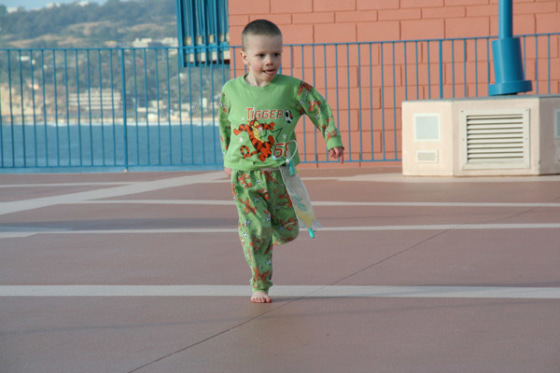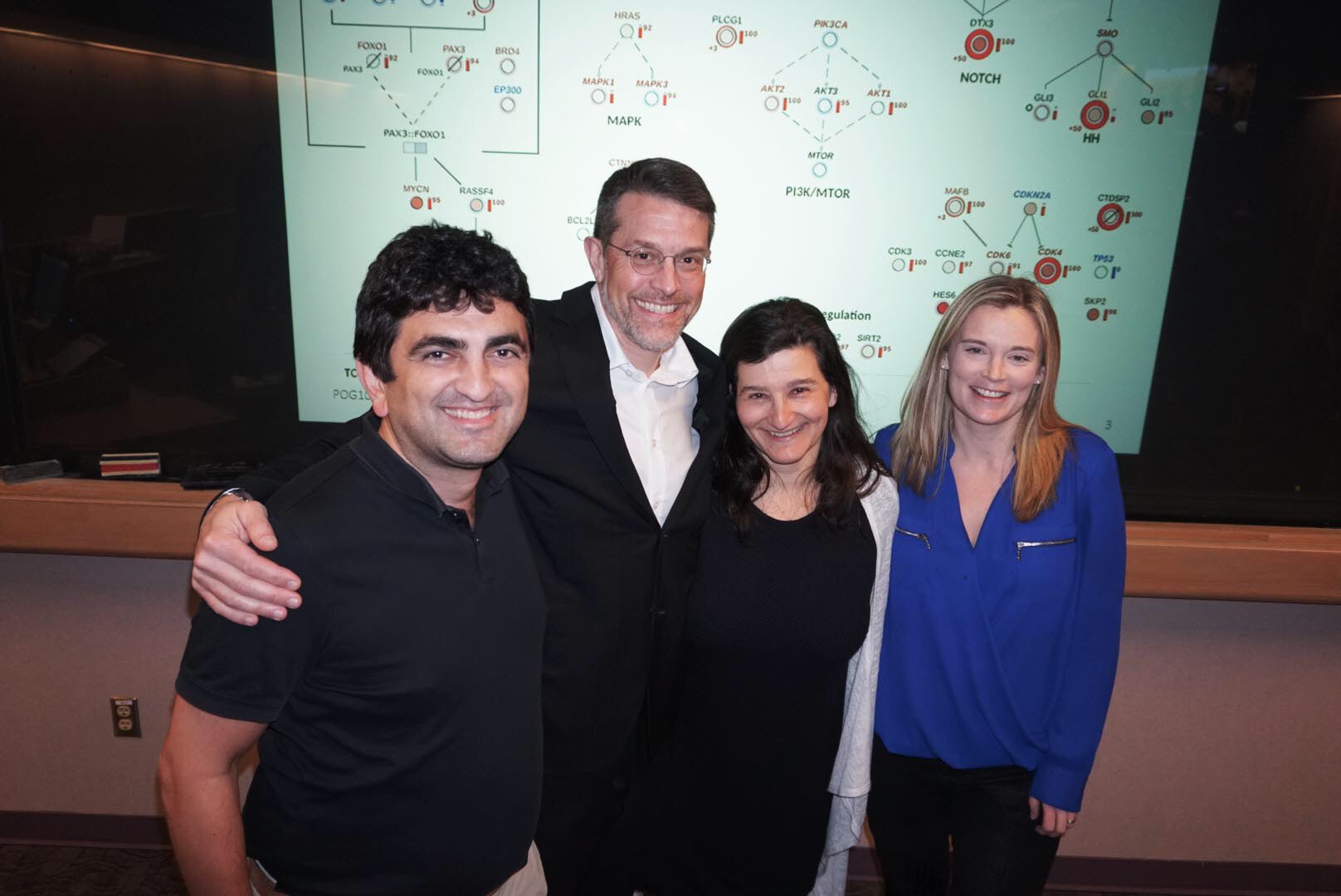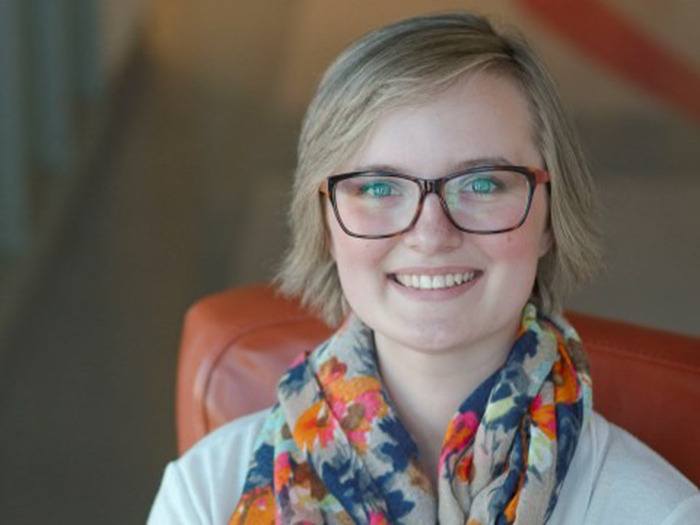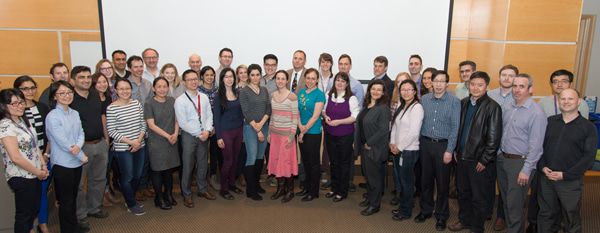The Story of PedsPOG: Advocates, Collaboration, & Team Science to help kids with cancer
Published in Cancer, Genetics & Genomics, and General & Internal Medicine

We have come a long way in the treatment of children with cancer, with cure rates of over 80%. Although it’s amazing what clinical trials and cooperative groups can do to improve outcomes, we are still failing one in five children that walk through our clinic doors. It is for these children that we need to harness the power of genomics to think outside of the box and identify novel targeted therapies. This is the goal of the Pediatric Oncogenomics study, “PedsPOG” as we call it and was the result of over a decade of work, where we show that almost all children can have therapeutic options identified if you utilize not only DNA, but also RNA expression from their tumors. DNA sequencing has become mainstream in cancer diagnostics, but there is also great potential in looking beyond the DNA and into the more challenging realm of RNA sequencing to identify pathways that can be targeted or tumours that may respond to immunotherapy. Our study showed that 12 to 15% of children with cancer have germline mutations that predispose them to cancer, most of which we don’t identify in the clinic. Armed with this information, we can initiate screening protocols to allow earlier detection of future cancers, both for them and potentially for other family members.
The story of how PedsPOG started is a remarkable one, and goes back to the year 2007, when Dr Don Rix, a retired physician in British Columbia, presented with locally advanced adenocarcinoma of the tongue. He received standard chemotherapy and progressed on this, which would usually result in no further treatment. However, being a well-connected pathologist, he knew that just a few blocks away from BC Cancer was the research building of the Genome Science Centre where a genomics expert Dr Marco Marra had developed a program to sequence the genome of cancer cells. He encouraged his oncologist, Dr Janessa Laskin, to reach out to Dr Marra – and through this introduction an idea was launched to sequence Dr Rix’s adenocarcinoma and use that information to try to identify new potential therapeutic options. This led to the world’s first case of whole genome sequencing for use in personalized treatment and was published in Genome Biology (ref 1 and 2). With proof of principle that this could be done in real time to help in therapeutic decision making, and with the backing of generous philanthropic donors, the Personalized Oncogenomics (or “POG” Project) was born, initially for adults with relapsed tumors.

The pediatric arm of the POG project has its roots back in the year 2007, when a 20-month-old named Finn Sullivan was diagnosed with rhabdomyosarcoma. Drs Rebecca Deyell and Rod Rassekh had the pleasure of looking after this energetic child during their oncology fellowships. Unfortunately, after a year of chemotherapy his cancer returned. He was treated with standard relapse chemotherapy and radiation, until cancer took his life on October 9, 2008. His loving parents and siblings decided to honor Finn by creating the Team Finn Foundation in order to find better treatments for children with cancer. Their goal was to allow kids with cancer to “Run Jump Bounce Dance Sing Love Smile Ride”. Not only did they fundraise to support both research and clinical needs, but his father Patrick Sullivan became a parent advocate and immersed himself in the world of science and discovery. He heard about Dr Laskin and Marra and their ambitious goal of using genomic sequencing to help directly treat patients. He sent an email introduction to the four of us and pledged to support five pilot pediatric cases to be included in the project – and with this, PedsPOG came to life.

The concept was an easy one…. yet the journey to operationalize this was challenging, especially in pediatrics. There were numerous logistical and ethical challenges to overcome. This was very early days of genomic sequencing – and there were real concerns about the ethics of sequencing pediatric patients, who could not consent for themselves. Is it ok to sequence a child’s germline genes and risk discovering adult onset conditions, incidental findings and variants of uncertain significance? Is it ethical to get a biopsy on a child and put them through an invasive procedure given that there may not be a clinical need for that biopsy. Surgeons, interventional radiologists, pathologists and the pathology technicians needed to change their ways of handling the specimens so that DNA and RNA could be extracted. Geneticists and ethicists formed a germline review committee with clinicians. This took hours of meetings and discussions to enable change. The success of this project came down to literally dozens of individuals from across various disciplines (oncologists, pathologists, ethicists, geneticists, informaticians, genetic counsellors) who spent hours of their time in order to create the protocol and operating procedure to finally launch our project in October 2013.
We recall the excitement we had back in 2013, when Rebecca and I enrolled our first patient – PedsPOG patient 001 – a teenager with metastatic infantile fibrosarcoma. Sequencing identified an ETV6-NTRK3 fusion, but unfortunately this was years before the discovery of TRK inhibitors. RNA sequencing identified upregulation of several pathways, and the bioinformaticians found pre-clinical papers suggesting ALK inhibitors could be useful in her treatment. With this very low level of evidence, but given she had failed all other chemo options, we started her on an oral ALK inhibitor. I remember the day she came back for her PET-CT scan after a few cycles of treatment, and the disbelief we had when the PET-CT scan showed a response to therapy. First patient – first success! Unfortunately the success only lasted two years – but this was two years she and her family were thankful for (ref 3).

This paper is the culmination of over a decade of work – and what this has taught us is the power of Team Science and of people. The number of authors on this paper is large, as this truly was a project built by an army of individuals. However the author list only captures the tip of the iceberg of who was involved in this success – to all the nurses, doctors, pathologists, techs, radiologists, research associates, geneticists, bioinformaticians, lab scientists, etc etc– thank you for all your hard work. We also need to thank the funders and philanthropic supporters of this project through the BC Cancer Foundation, BC Children’s Hospital Foundation and the Team Finn Foundation – without them this work could not have been done. Most importantly, thank you to the parents, families and most of all the amazing children and teens that make up the 79 participants who are described in this paper. Each of these 79 individuals not only have a unique tumor, but behind each of these is an inspiring individual, each with a unique perspective and life well-lived, but all with the one thing in common: the courage to be early participants in a sequencing initiative. Their courage led to the success of PedsPOG – and the fact that PedsPOG has now expanded to join forces with national Pan-Canadian initiative called PROFYLE, through partnerships with similar projects in Ontario and Quebec (ref 4).

References:
- https://vancouversun.com/news/staff-blogs/mystery-revealed-identity-of-the-high-profile-vancouver-biomedical-mogul-1st-in-world-to-get-gene-sequencing-for-cancer-rx
- Jones et al, Genome Biology, 2010, 11:R82 (https://genomebiology.biomedcentral.com/articles/10.1186/gb-2010-11-8-r82)
- https://russianmachineneverbreaks.com/2014/10/28/the-inspiring-story-behind-the-girl-from-sundays-ceremonial-faceoff-with-alex-ovechkin/
- https://www.profyle.ca/
We would like to thank the families of Finn Sullivan and Brooke Malakoff for allowing us to share their photo and stories for this post.
Follow the Topic
-
Nature Communications

An open access, multidisciplinary journal dedicated to publishing high-quality research in all areas of the biological, health, physical, chemical and Earth sciences.
Your space to connect: The Cancer in understudied populations Hub
A new Communities’ space to connect, collaborate, and explore research on Cancers, Race and Ethnicity Studies and Mortality and Longevity!
Continue reading announcementRelated Collections
With Collections, you can get published faster and increase your visibility.
Women's Health
Publishing Model: Hybrid
Deadline: Ongoing
Advances in neurodegenerative diseases
Publishing Model: Hybrid
Deadline: Mar 24, 2026





Please sign in or register for FREE
If you are a registered user on Research Communities by Springer Nature, please sign in